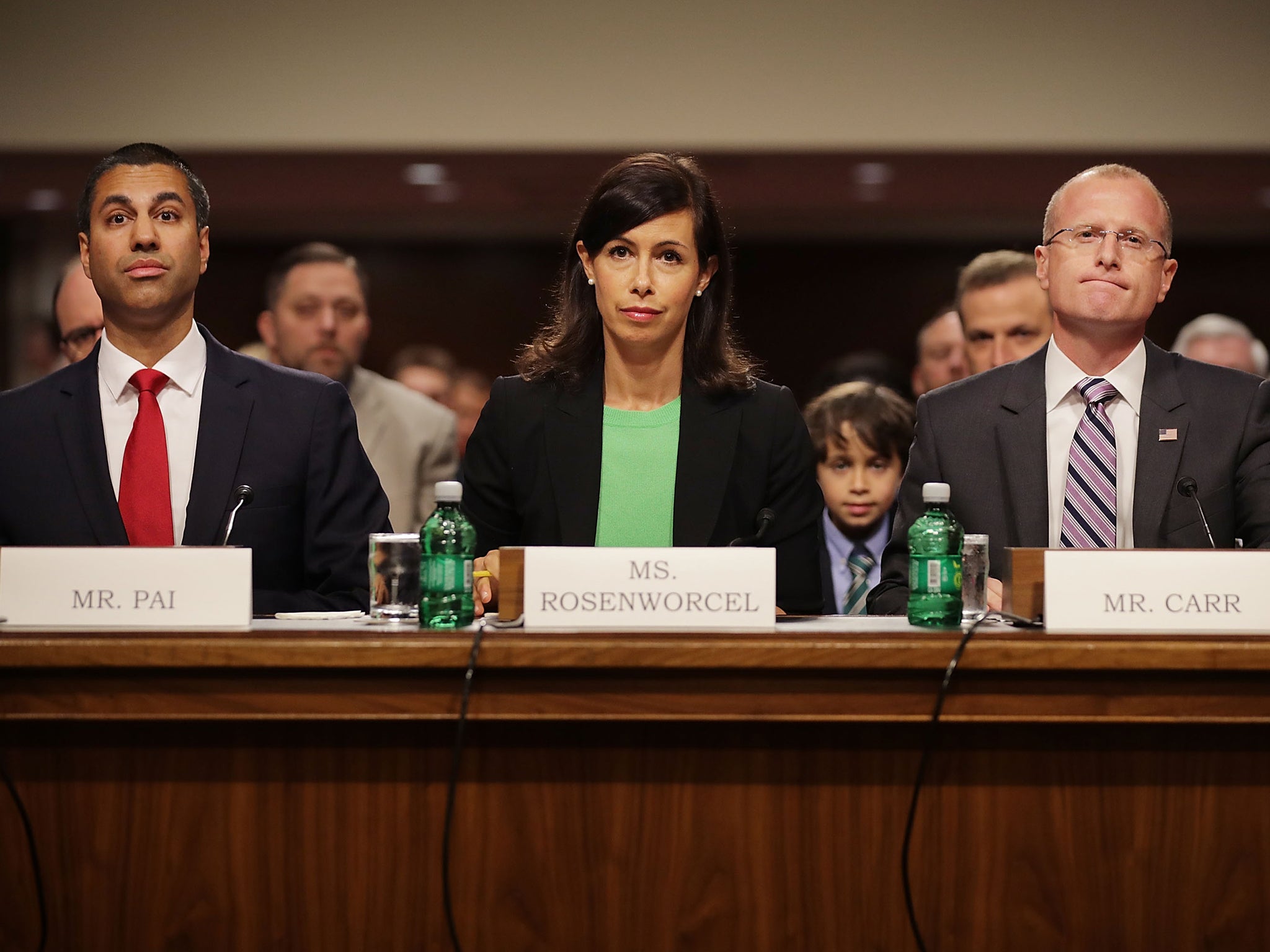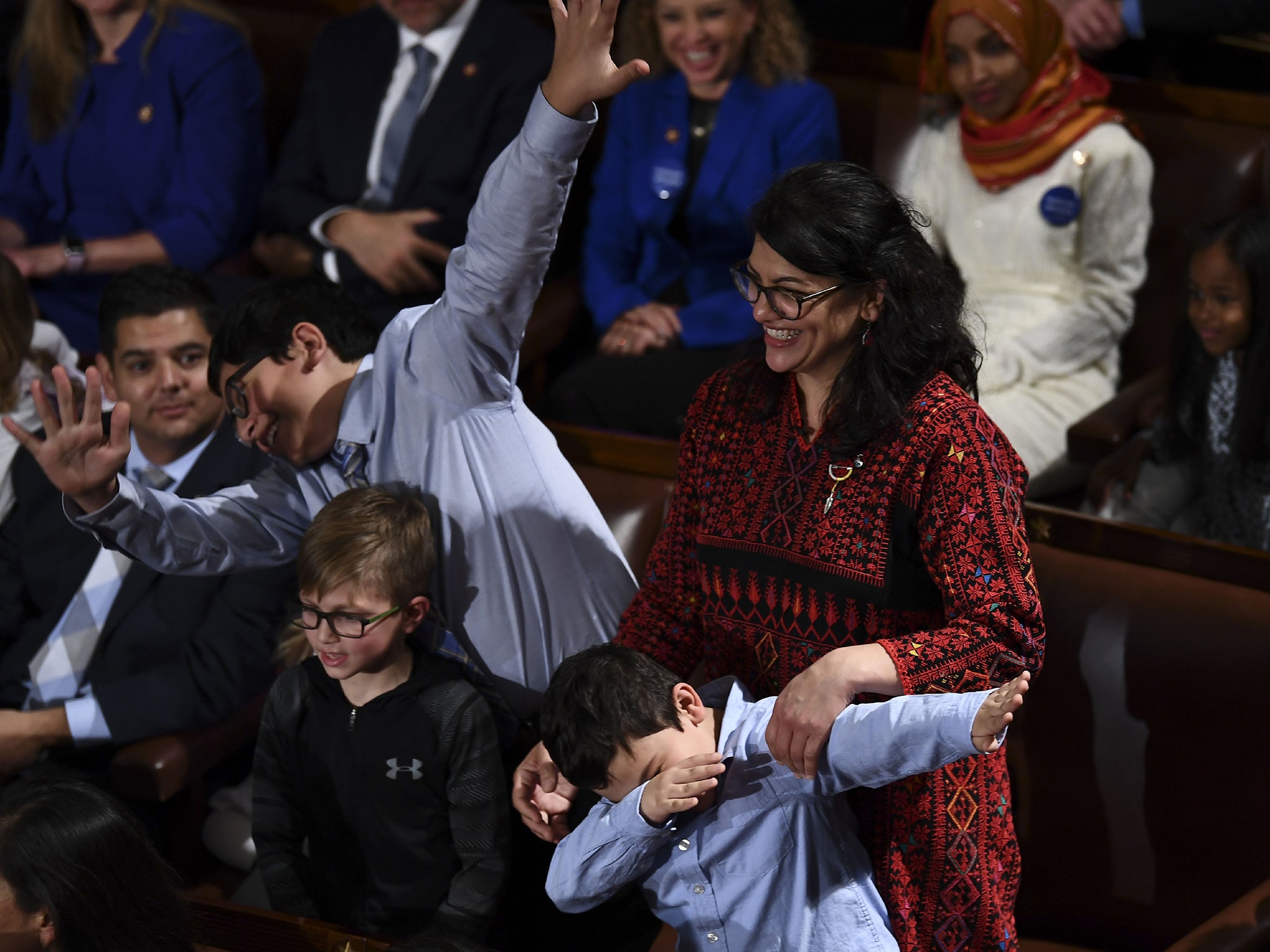‘Moms in the House’ caucus: US congresswomen bond over motherhood
US congresswomen who are mothers face a challenge unique to them, writes Caitlin Gibson

Your support helps us to tell the story
From reproductive rights to climate change to Big Tech, The Independent is on the ground when the story is developing. Whether it's investigating the financials of Elon Musk's pro-Trump PAC or producing our latest documentary, 'The A Word', which shines a light on the American women fighting for reproductive rights, we know how important it is to parse out the facts from the messaging.
At such a critical moment in US history, we need reporters on the ground. Your donation allows us to keep sending journalists to speak to both sides of the story.
The Independent is trusted by Americans across the entire political spectrum. And unlike many other quality news outlets, we choose not to lock Americans out of our reporting and analysis with paywalls. We believe quality journalism should be available to everyone, paid for by those who can afford it.
Your support makes all the difference.How are your kids doing?
It isn’t the question itself that bothers Katie Porter. The freshman Democratic congresswoman from California, a single mother of three children, is perfectly aware that enquiring about another person’s family is just polite small talk.
But there’s something about the way some people ask her, the subtle emphasis on that last word – “how are your kids doing?” – that makes her bristle.
“As if they’re suffering,” Porter says. Her colleagues surrounding her in the stately room at the Library of Congress nodded knowingly. “As if they’re not thriving and doing great.”
The nine women who had gathered for an early breakfast on a recent morning – fellow mothers and members of the House of Representatives, joined by FCC commissioner Jessica Rosenworcel – could tell variations of this same story, about the myriad moments when they felt questioned or judged for living publicly as mothers who hold particularly high-profile jobs.
For Rosenworcel, who was invited to talk about her experience as a working mom and the only female FCC commissioner, a defining encounter occurred during a business negotiation years ago, when a man said to her: “It must be so hard for you to do this job as a mom.” (She was so infuriated, she says, “I got everything I wanted out of that negotiation, and then some.”)
Representative Debbie Wasserman Schultz (Florida), recalled a male colleague’s obvious discomfort when she once nursed her infant daughter in her congressional office: “Because, yeah, she had to eat,” she says. The women in the room answered with a chorus of murmured affirmation.
In 2019, in the era of #MeToo, when discussions of gender roles and equality are very much in the mainstream, a group of women sitting together and sharing stories about working motherhood probably shouldn’t feel so radical. But this is Capitol Hill, where the first lactation room in the house wasn’t installed until 2007 (after Nancy Pelosi demanded it), where the first women’s restroom off the house floor was only added in 2011, and where until 2017 it was forbidden for women to bare their shoulders in the House Speaker’s Lobby.
Then came the 2018 election and its historic influx of female lawmakers – led by women who touted their motherhood bona fides with pride – and Wasserman Schultz, who came to Washington in 2005 as the mother of twin 5-year-olds and a 1-year-old, decided the time had come to launch what she calls the “Moms in the House” caucus. She invited the 25 mothers of school-age children in the house (21 Democrats and four Republicans) to join the group, the first of its kind in congressional history.
“We are doing these jobs differently than the majority of congress,” Wasserman Schultz told the group gathered around the breakfast table. “I want this to be a vehicle, not only to be supportive of one another but also to help each other be successful, to use it as a way for us to advance an agenda and collect our power, to move things forward.”
She smiled and added: “And to just maybe have some comfort, where we can come together, because we’re living through the same experience.”
Of course, it isn’t exactly the same experience. Among the Moms in the House caucus are mothers of sons, and of daughters, older children, younger children and stepchildren. Rep Angie Craig (Minnesota), is the first lesbian mother elected to congress; Reps Ilhan Omar, (Minnesota) and Rashida Tlaib (Michigan), are the first Muslim mothers. Even among the handful of women gathered recently over breakfast, differences were apparent.

“I have an incredibly supportive husband, and that’s really the only reason I’m able to do this,” says Rep Kim Schrier (Washington).
“I have a very, very supportive spouse,” Rep Jennifer Wexton (Virginia), echoed. “When women ask for advice about ‘how can I do it all,’ number one, I say, ‘you gotta find a great partner’.”
Then it was Porter’s turn. “I don’t have any spouse,” she says, “and I’m happy that way.”
Even though there are more women and more mothers in congress than ever before, being a single mother – a circumstance shared by about one in four American mothers – is still rare enough here to feel isolating, Porter says later.
“It was a moment of my realising how different I am,” she says. “And until we have a lot more women in congress, there are still going to be those moments.”
Although the 2018 midterm elections brought the proportion of women in the legislature to an all-time high, nearly doubling the number of working mothers, the percentage of women in Congress – 24 per cent – still falls far short of mirroring the American populace.
All of the new additions were in the house, and most were Democrats – though motherhood is a role that has increasingly been emphasised by members of both parties. (Kelly Ayotte, former Republican senator from New Hampshire, often spoke about her children and the challenges of running for office when they were young; Rep Cathy McMorris Rodgers of Washington – who in 2013 became the first woman to give birth to three children while serving in congress – has frequently discussed her son with Down syndrome and founded a Congressional Down Syndrome Caucus.)
So far, only Democrats have attended the monthly Moms in the House events, which began in January, though Wasserman Schultz says Republican members have expressed interest. There is also an active text group, she says, in which members frequently turn to one another for advice: should the whole family move to Washington? What are the best summer camps in DC? What to do with visiting kids when Mom has to be on the house floor to vote?
Ultimately, she says she hopes the group will use “the strength in our numbers” to push family-focused issues – affordable child care and stronger parental-leave policies, for instance – to the top of a legislative agenda. But the main purpose is to serve as personal and professional support, she says, to empower members to embrace their dual roles as parents and lawmakers.
So when Rosenworcel brought up the issue of net neutrality and the digital divide over breakfast, the congresswomen around the table discussed the challenges facing children who can’t complete their homework because they don’t have internet access.
And at a House Financial Services Committee hearing last week, during a confrontation with JPMorgan Chase chief executive Jamie Dimon, Porter assailed the bank’s low wages by describing the impossibility of a single mother with a 6-year-old child trying to survive on an entry-level salary. In an exchange that went viral, Porter concluded that the hypothetical mother in question would run a deficit of nearly $600 per month.
“What I’d like you to do,” she told Dimon, “is provide a way for families to make ends meet.”
For many years, mothers in congress have supported one another behind the scenes, Wasserman Schultz says, but the current moment felt worthy of something more.

“It was always really important to me, the bits of advice that I was able to get from more-experienced, veteran moms in congress, and that was advice I’ve quoted through the years to women who were thinking about running,” she says. “So it’s really been a gradual crescendo for me to reach this point.”
After the caucus was announced, a flurry of questions followed, about what it meant – practically, symbolically – to see these women assemble, to proudly identify themselves as mothers.
“When people ask me, ‘What is the significance of so many women and mothers being in the US congress?’ you know, it’s great for young girls that they see this representation,” Craig says. “But maybe it’s even more important that my four sons grow up in a world where women are fully representing them. This is the new normal for them, that women are at the policymaking table.”
But even the new normal is still far from equal, says Jennifer Lawless, a political scientist at the University of Virginia and an expert on women in politics.
“The fact that this moms’ caucus has to exist continues to demonstrate the incredibly disproportionate share of household labour and child care that women, even in the top tier of professional accomplishment, remain responsible for,” Lawless says. “There are a lot of men who have had young kids, and never has there been attention on how to focus those dual roles. So it’s in some ways a double-edged sword. It highlights the need to figure out a way to be able to balance your home life and your profession, but the downside is that it’s reinforcing this idea that this is a problem only women face.”
And that problem, she says, isn’t likely to be solved in congress; cultural norms can’t be legislated.
“That’s not to say that if we have more favourable leave policies, that that won’t help generate the conversation, and that things can’t change,” Lawless says. “But it won’t be in four or eight years.”
Wasserman Schultz is aware of this dichotomy. “It’s wonderful that we have a critical mass of moms with school-aged children and we can be there for one another, and have a platform to advance an agenda important to women and families,” she says, “and at the same time, we shouldn’t need that support network because it shouldn’t be any different to be a mom in congress than to be a dad in congress.”
She paused. “Only it is, and you have to deal with reality.”
The ultimate goal of the caucus, then?
“I’d like to hope,” she says, “that our existence helps us to ultimately not need to exist.”
© Washington Post
Join our commenting forum
Join thought-provoking conversations, follow other Independent readers and see their replies
Comments